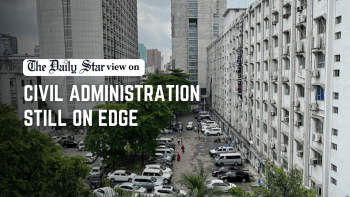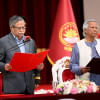Local govt appointees must show integrity

We welcome the interim government's move to appoint administrators at city corporations and all other tiers of local government, filling a vacuum created by the large-scale abstention, desertion, and eventual termination of mostly Awami League-linked public representatives. The decision comes amid concerns over the lack of leadership in these vital institutions and resultant disruptions in public services. However, we must acknowledge that this is but a temporary measure that may not resolve all longstanding grievances surrounding these bodies.
According to a report by this daily, the government got rid of the mayors of all 12 city corporations and 330 municipalities; 61 zilla parishad chairmen; 493 out of 495 upazila parishad chairmen; and 988 vice-chairmen and women vice-chairmen at upazila parishads. Instead, additional secretaries and divisional commissioners have been put in charge of the city corporations, and additional deputy commissioners and assistant commissioners (land) in charge of the municipalities. Deputy commissioners (DCs) will run 53 zilla parishads, while divisional commissioners will run the Dhaka, Chattogram, Rajshahi, Khulna, Sylhet, Mymensingh, Rangpur, and Barishal zilla parishads. Meanwhile, UNOs will run the 395 upazila parishads. These appointees, as government officials, should already be familiar with the modus operandi of local government bodies, and thus must prioritise the areas requiring immediate attention.
For example, in cities and municipalities, dengue control is a priority at the moment. At the same time, activities that have been suspended because of the recent unrest should be resumed on an urgent basis. For instance, Chattogram city has been struggling with waterlogging because drains have not been cleaned for almost a month. The divisional commissioner of Chattogram should address this immediately and bring respite for the city dwellers. As the LGRD adviser mentioned during an interaction with reporters, the administrators at the local levels would ensure that daily activities such as birth and death registration or implementation of Food for Work projects are not disrupted. However, we must remember that UNO or DC offices are not as accessible to villagers as that of elected representatives. Government offices also have a reputation for slow service delivery. Care must be taken so that the appointment of administrators does not lead to lengthy project implementation or sluggish services.
The government must also be mindful that the delegation of authority to administrators does not create any conflict of power among various ranks of executives, as witnessed recently in civil and police administrations. We hope that government officials, entrusted with the power to work independently of public representatives, will be accountable to the public and ensure transparency in their dealings with public funds.

 For all latest news, follow The Daily Star's Google News channel.
For all latest news, follow The Daily Star's Google News channel. 










Comments